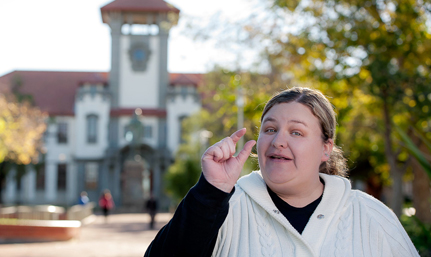|
 |
Presents Extraordinary Findings at International Nanomedicine Conference.
Photo: Sonia Small
04 June 2013 |
Dr Chantel Swart, an alumnus of the Prestige Scholars Programme (PSP) from the Department of Microbial, Biochemical and Food Biotechnology, is an invited “Expert on Stage” at the 4th International Nanomedicine Conference to be held in Sydney, Australia from 1 – 3 July 2013.
She is to share the podium with world authorities in nanomedicine.
Dr Swart’s presentation, “A New Nanotechnology for Nanomedicine”, will convey findings that made international headlines. She is part of the nanotechnology group of Prof Lodewyk Kock that discovered gas bubbles inside cells when using Auger-architectomics, a nanotechnology they developed in 2010. This nanotechnology is used to track nanomedicine inside cancer cells in collaboration with the Mayo Clinic in the US.
The Kock Nanotechnology Group includes scholars from the departments of Microbial, Biochemical and Food Biotechnology, Physics, Chemistry, the Centre for Microscopy (all from the UFS) and South African Breweries. Their breakthrough is also showcased on the cover of all issues of 2013 FEMS Yeast Research, a leading journal in yeast research. BiotecVisions and Global Medical Discovery (GMD) both selected this work for worldwide promotion at the end of 2012.
Dr Swart’s future research will use this newly-developed nanotechnology to visualize and hence explore the exposed nano-world. This will include work on the architecture of cells and effects of various drugs on cell metabolism.
A virtual tour is available at: http://vimeo.com/user6296337/videos.